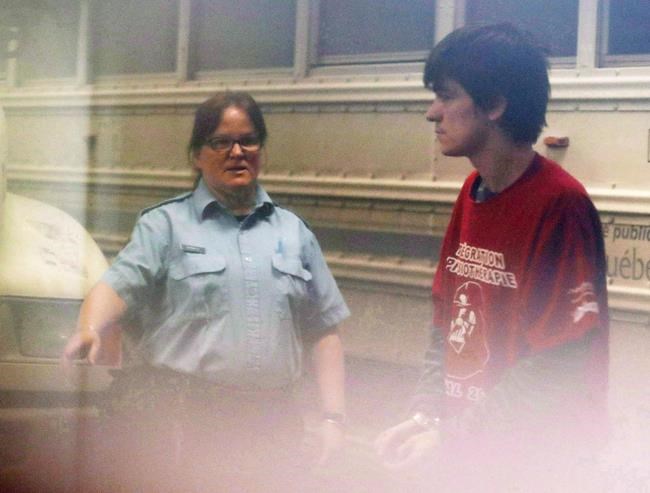Quebec mosque shooter not motivated by racism, his sentence should be reduced: lawyer
Advertisement
Read this article for free:
or
Already have an account? Log in here »
To continue reading, please subscribe:
Monthly Digital Subscription
$1 per week for 24 weeks*
- Enjoy unlimited reading on winnipegfreepress.com
- Read the E-Edition, our digital replica newspaper
- Access News Break, our award-winning app
- Play interactive puzzles
*Billed as $4.00 plus GST every four weeks. After 24 weeks, price increases to the regular rate of $19.00 plus GST every four weeks. Offer available to new and qualified returning subscribers only. Cancel any time.
Monthly Digital Subscription
$4.75/week*
- Enjoy unlimited reading on winnipegfreepress.com
- Read the E-Edition, our digital replica newspaper
- Access News Break, our award-winning app
- Play interactive puzzles
*Billed as $19 plus GST every four weeks. Cancel any time.
To continue reading, please subscribe:
Add Free Press access to your Brandon Sun subscription for only an additional
$1 for the first 4 weeks*
*Your next subscription payment will increase by $1.00 and you will be charged $16.99 plus GST for four weeks. After four weeks, your payment will increase to $23.99 plus GST every four weeks.
Read unlimited articles for free today:
or
Already have an account? Log in here »
Hey there, time traveller!
This article was published 27/01/2020 (2085 days ago), so information in it may no longer be current.
QUEBEC – The Quebec City mosque shooter entered a Muslim prayer space Jan. 29, 2017, armed with two guns, and murdered six men — but there was no evidence he was motivated by deep-seated racism, the man’s lawyer argued Monday at the Court of Appeal.
Defence lawyer Charles-Olivier Gosselin said the misinterpretation of Alexandre Bissonnette’s motive was just one of several errors trial judge Francois Huot of the Superior Court made before sentencing his client last February to life in prison without the possibility of parole for 40 years.
Those mistakes led Huot to make an unreasonable decision, Gosselin said, adding the killer should instead be eligible for parole after 25 years in prison.

Bissonnette’s sentence was also appealed by the Crown, who argued Monday the 30-year-old gunman shouldn’t be eligible for release from prison before serving 50 years. Prosecutor Thomas Jacques told the court Bissonnette, who was not at the hearing, committed possibly the worst hate crime in Canadian history.
During sentencing last February, Huot said the killer had acted out of “hatred” and “racism” and had destroyed the lives of many people. Intolerance and racism, Huot said, “rots the social fabric,” and it was the duty of the courts to “repress them firmly when they materialize in criminal acts.”
But Gosselin said hatred and racism did not motivate his client and there was “no evidence” presented at trial that could prove it.
Instead, Bissonnette was mentally ill and wanted to kill himself, Gosselin explained. Bissonnette just needed a reason to justify taking his own life, so he decided to murder men in a mosque, even if that logic was “twisted,” Gosselin told the court.
Gosselin also took issue with Huot’s contention that Bissonnette’s actions were premeditated. Bissonnette had been developing certain ideas in his head, the lawyer said, but only solidified them in the “days and hours” prior to the murders.
The third error made by the trial judge, Gosselin argued, was when Huot claimed there were minors inside the mosque at the time of the shooting. Gosselin said that Bissonnette had never targeted children.
But the appellate judges interrupted the lawyer’s arguments — just as they did throughout his presentation — to ask him why Bissonnette pleaded guilty to the attempted murder of children.
Bissonnette pleaded guilty in March 2018 to six counts of first-degree murder and six of attempted murder. His victims were Mamadou Tanou Barry, 42; Abdelkrim Hassane, 41; Khaled Belkacemi, 60; Aboubaker Thabti, 44; Azzeddine Soufiane, 57; and Ibrahima Barry, 39.
Jacques, the prosecutor, said Bissonnette deliberately chose his victims according to his prejudices and had made “exceptional plans” to carry out the murders. The hatred that was on display that January night was a frontal attack on the values of Canadian society, said Jacques.
A sentence of life with no possibility of parole before 40 years didn’t reflect the gravity of the crimes that were committed, Jacques said. Fifty years was more reasonable, said the prosecutor. At the trial, the Crown had argued Bissonnette should have to serve 150 years before the possibility of parole.
Also at issue in the appeal is a section of the Criminal Code that applies in cases of multiple murders. The section allows a judge discretion to deliver consecutive life sentences in blocks of 25 years. In his ruling, Huot had rewritten the 2011 consecutive sentencing law, deciding that Bissonnette would serve at least 40 years in prison.
Huot had said a sentence of 50 years or more would constitute cruel and unusual punishment under the Canadian Charter of Rights and Freedoms.
Jacques asked the Appeal Court to put in place a legal framework to guide judges in sentences involving multiple murders.
The Appeal Court judges reserved their decision.
This report by The Canadian Press was first published Jan. 27, 2020.


